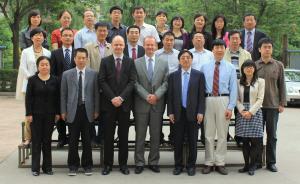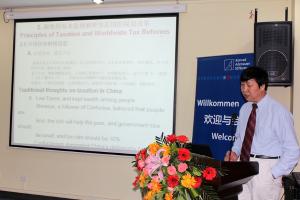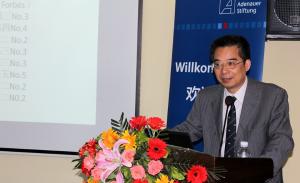The Chinese Tax System Reform - Foundation Office China
Workshop
Details
The tax system is of great significance not only for the fiscal situation of a country, but it also possesses a fundamental impact on the consumption and saving structure as well as on investments by companies and public infrastructure investments. At the current time, the Chinese society is characterized by significant income differences, unequal regional development and increasing communal spending. Those challenges were closely examined during the workshop on the Chinese tax system:
1.The contribution of a modern tax system to social equality
2.Taxation as an instrument for economic policy
3.The situation of the tax system on the communal level
The following paragraphs summarize the main findings of the workshop:
After an introduction into the international discussion on taxation policy by Ralph Brügelmann, tax expert of the Cologne Institute for Economic Research, professors of various universities, among them Prof. Lin Shuanglin, Beijing University and Prof. Zhu Weiqun, Shanghai University of Finance & Economics, as well as representatives from the economic and political field discussed the questions mentioned above in three panels. A final round table provided an opportunity for a fruitful discussion but also gave the audience a chance for questions and comments.
The tax reform of 1994 constitutes the foundation for the fiscal system of today’s China. The economic growth focused reforms did not only increase the proportion of taxes in relation to GDP from 10.8% (1994) to 22% (2011) but also strengthened the control by the central government. Besides the increase in the tax income, which had largely been perceived as too low, some negative consequences of the tax reforms can be observed.
Indeed, the inequality within the Chinese society has increased over the last years, which is reflected by a GINI coefficient of 0.47 (2010). In addition, the centralisation of the tax revenue and legislative power has resulted in a funding shortfall of many communes as well as resulting massive debt and curtailing of their public responsibilities (education, social programmes). According to Chinese tax experts, the tax system is not transparent, complicated and consists of too many different taxes and tax rates. The personal income tax is too focused on middle incomes, despite its progressive structure and the recent increase of the share of salary not taxed to now 3,500 RMB/month.
Even though China’s tax revenues lie below the level of most western industrialised countries, tax revenue is increasing by over 20% annually and therefore provides the Chinese government with room to manoeuvre when executing public spending. In order to reduce social inequality within the society, China should to a higher degree pursue a tax system which is aimed at equality. This goal can be achieved through the strengthening of redistribution mechanisms like the intensification of the progressivity of the personal income tax. In addition, a comprehensive income tax with limited exceptions could support this goal. A widening of the tax base through taxes on e.g. property and heritage in combination with a partial shift of legislative power to the provincial level as well as a simplification of the tax system could improve the fiscal situation of China further.
Overall, China should pursue a tax system which is as neutral as possible in order not to negatively interfere with economic decisions through the design of the tax system. A stronger taxation of immobile factors, such as land, but also higher consumption taxes are possible options.
Furthermore it was made clear that social equality within a society can not be achieved through the tax system alone but also requires free access to education and social institutions in addition to a broadened participation of the public in decision considering taxation policy.






